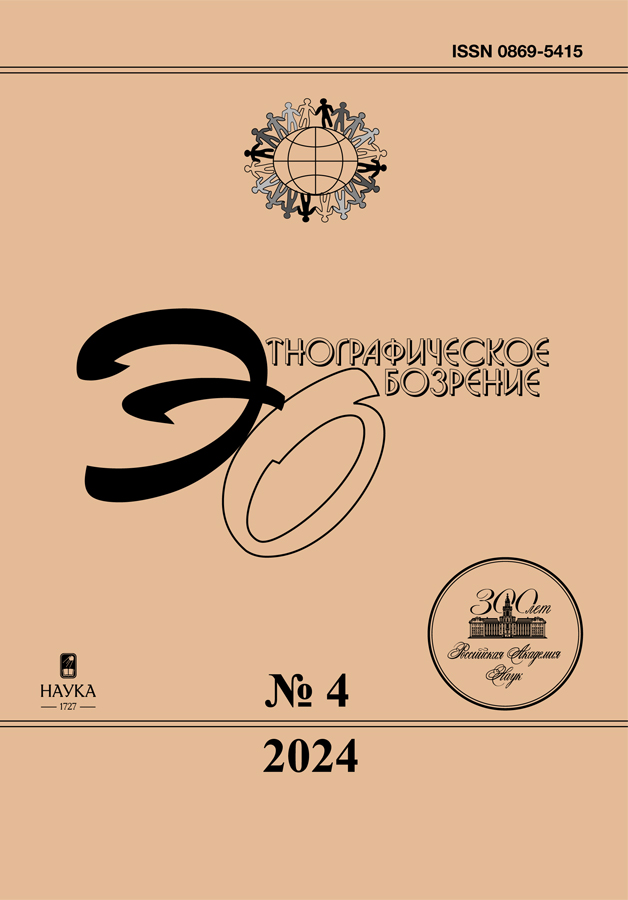Religious Identity in the Context of Present-Day Ritual Culture of the Kyrgyz People
- 作者: Kochkunov A.S.1
-
隶属关系:
- Kyrgyz-Russian Slavic University named after B.N. Yeltsin
- 期: 编号 4 (2024)
- 页面: 140-160
- 栏目: Research Articles
- URL: https://cijournal.ru/0869-5415/article/view/672464
- DOI: https://doi.org/10.31857/S0869541524040089
- EDN: https://elibrary.ru/AYEPRZ
- ID: 672464
如何引用文章
详细
The article examines the ethnographic aspects of the religious identity of the Kyrgyz people, expressed through attitudes to the rituals of the family cycle, mainly funeral and memorial rites. The article describes the features of the development of religious culture, regional differences in the manifestation of religious identity, the place of ritual in the discourse between traditionalism and Islamic normativity, and issues of regulating rituals. The uniqueness of the history of the religious life of the Kyrgyz people is noted, which lies in repeated modernization during the 20th century: the transition from total atheization to the revival of religious consciousness. The diversity and inconsistency of religious identities, the nature of the clash of positions between different trends on the values of the folk ritual of the family cycle are studied. It defines that today the rituals of the folk have become the central issue of the discourse between traditionalists, Islamic normativists, “statists” and representatives of secular approaches. The author comes to the conclusion that the regulation of some aspects of rituals, in particular funeral and memorial rituals, shows a tendency towards convergence of state and religious (Islamic) approaches, which in the future may lead to contradictions between different identities.
全文:
作者简介
Aidarbek Kochkunov
Kyrgyz-Russian Slavic University named after B.N. Yeltsin
编辑信件的主要联系方式.
Email: aidar.k@mail.ru
ORCID iD: 0000-0002-8856-3080
д. и. н., профессор
吉尔吉斯斯坦, 44 Kievskaia Str., Bishkek, 720000参考
- Abramzon, S.M. 1990. Kirgizy i ikh etnogeneticheskie i istoriko-kul’turnye sviazi [Kirghiz and Their Ethnogenetic and Historical-Cultural Ties]. Frunze: Kyrgyzstan.
- Aitpaeva, G.A. 2004. Fenomen mazarov v Kyrgyzstane (postanovka problemy i gipotezy) [The Phenomenon of Mazars in Kyrgyzstan (Problem Statement and Hypothesis)]. AUCA Academic Review 2: 128–139.
- Aitpaeva, G.A., G. Aldakeeva, and A. Egemberdieva. 2010. Riadovye islama, ili fenomen moldolora v sovremennom Kyrgyzstane [Ordinary Islam, or the Phenomenon of Moldolor in Modern Kyrgyzstan]. Etnograficheskoe obozrenie 5: 21–36.
- Asankanov, A.A., O.I. Brusina, and A.Z. Zhaparov, eds. 2016. Kyrgyzy [Kirghiz]. Moscow: Nauka.
- Baialieva, T.J. 1972. Doislamskie verovaniia i ikh perezhitki u kirgizov [Pre-Islamic Beliefs and Their Survivals among the Kyrgyz]. Frunze: Ilim.
- Basilov, V.N. 1992. Shamanstvo v regionakh Srednei Azii i Kazakhstana [Shamanism among the Peoples of Central Asia and Kazakhstan]. Moscow: Nauka.
- Diushenbiev, S. 2011. Islam v sovremennom Kyrgyzstane: sostoianie i problemy [Islam in Modern Kyrgyzstan: State and Problems]. Religiovedenie 3: 107–126.
- Elebaeva, A.B., N.S. Esenamanova, and Z.D. Chotaev. 2016. Vliianie religioznogo faktora na sotsial’no-politicheskuiu situatsiiu v Kyrgyzskoi Respublike. Sotsiologicheskoe issledovanie [The Influence of the Religious Factor on the Socio-Political Situation in the Kyrgyz Republic: Sociological Research]. Bishkek: Triada Print.
- Esenamanova, N. 2003. Islam v Tsentral’noi Azii: istoriia i sovremennost’ [Islam in Central Asia: History and Modernity]. Bishkek: MUK.
- Kochkunov, A.S. 2018. Elementy islamskoi religii v traditsionnoi kul’ture kyrgyzov (k voprosu izucheniia religioznykh aspektov gosudarstvennoi kulturnoi politiki) [Elements of Islamic Religion in the Traditional Culture of the Kyrgyz (On the Issue of Studying Religious Aspects of State Cultural Policy)]. Vestnik ASUPKR24: 316–321.
- Kochkunov, A.S. 2018. Religious Practices in the Modern Ceremonial Lives of the Kyrgyz People. Anthrology of the Middle East 13 (1): 43–54.
- Kurbanova, N.U. 2010. Religiia v obshchestvenno-politicheskoi zhizni Kyrgyzstana [Religion in the Socio-Political Life of Kyrgyzstan]. Bishkek: Altyn Tamga.
- Malikov, K.K., and E.E. Usubaliev. 2008. Musul’manskaia obshchina Kyrgyzstana i politicheskii protsess v strane [The Muslim Community of Kyrgyzstan and the Political Process in the Country]. Bishkek: KRSU.
- Manichkin, N.A. 2020. Shamanizm i dukhovno-magicheskie praktiki kyrgyzov [Shamanism and Spiritual and Magical Practices of the Kyrgyz People]. Moscow: Smart Event.
- Moldaliev, O.A. 2008. Islam i politika: politizatsiia islama ili politika islamizatsii? [Islam and Politics: Politicization of Islam or Islamization of Politics?]. Bishkek: Maxima.
- Murzakmetov, A.K. 2005. Kyrgyz yrym zhyrymdary [Kyrgyz Hymns]. Osh: Oshskii gosudarstvennyi universitet.
- Murzakhalilov, K. 2019. “Yakyn Inkar” v Kyrgyzstane: veroiatnost’ radikalizatsii [“Yakyn Inkar” in Kyrgyzstan: The Likelihood of Radicalization]. Religiovedenie 1: 121–130.
- Murzakhalilov, K., and M. Arynov. 2010. “Tabligi Dzhaamat” v Kyrgyzstane: osobennosti deyatel’nosti i vozmozhnye posledstviia dlia razvitiia religioznoi situatsii v respublike: analiz i prognozy [“Tablighi Jaamat” in Kyrgyzstan: Features of Activity and Possible Consequences for the Development of the Religious Situation in the Republic: Analysis and Forecasts]. Tsentral’naia Aziia i Kavkaz 3 (13): 185–192.
- Stasevich, I.V. 2018. Sovremennyi Kyrgyzstan: povtornaia islamizatsiia ili vozrozhdenie natsional’noi kul’tury [Modern Kyrgyzstan: Repeated Islamization or Revival of National Culture]. Etnograficheskoe obozrenie 2: 76–88.
- Stasevich, I.V. 2019. Obriady zhiznennogo tsikla v sovremennoi kirgizskoi kul’ture: sledovanie traditsiiam i zarozhdenie novykh praktik [Rituals of the Life Cycle in Modern Kyrgyz Culture: Following Traditions and the Emergence of New Practices]. Kunstkamera 2 (4): 38–50.
- Zhaparov, A.Z. 2019. O yubileinoi tseremonii u kirgizov [About the Anniversary Ceremony at the Kirghiz]. In Aktual’nye voprosy istorii kyrgyzskogo naroda: proshloe, nastoiashchee i budushchee [Current Issues of the History of the Kyrgyz People: Past, Present and Future], edited by K. Belek and N. Abdimitalip uulu, 334–340. Bishkek: Kyrgyzsko-Turetskii universitet Manas.
补充文件









